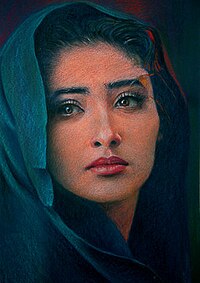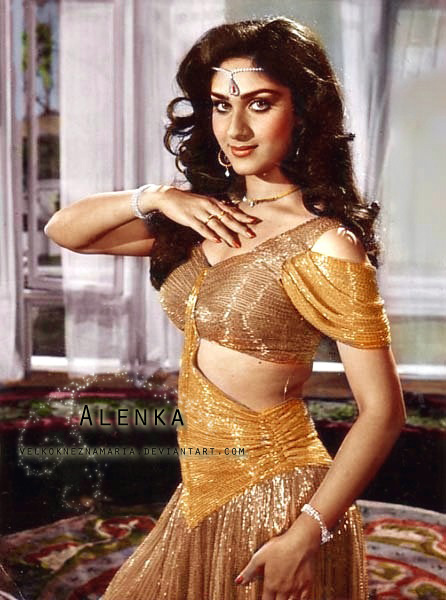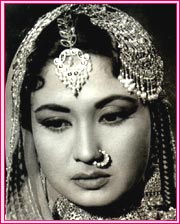Nick Name: Manya, Manu
Date of Birth (Birthday): 16 August, 1970
Zodiac Sign: Leo
Height: 5'5"
Hair Color: Black
Birth Place: Kathmandu, Nepal
Marital Status: Single
Languages: Hindi, English
Recognised for her acting prowess, Koirala was noted for her performances in films such as
Bombay,
Akele Hum Akele Tum (both 1995),
Khamoshi: The Musical (1996),
Dil Se.. (1998), and
Company (2002). She has won the Filmfare Critics' Award thrice and has received four nominations for the Filmfare Award for Best Actress
so far. Although box-office collections of her films have varied
considerably, critics have noted that her niche as an actor remains
unharmed irrespective of her commercial potent.
[4][5]
Off-screen she is frequented in the media as a "controversy's child"
with her bohemian stance and candid comments often described as
"outspoken" and "bold".
Manisha Koirala was born in Kathmandu, Nepal, Koirala family to Prakash Koirala and Sushma Koirala. Her grandfather Bishweshwar Prasad Koirala was the Prime Minister of Nepal during the late 1950s-early 1960s, as well as two of her late great-uncles, Girija Prasad Koirala and Matrika Prasad Koirala. Her father Prakash Koirala has also been a prominent politician and a Cabinet Minister. She studied at Vasant Kanya Mahavidhyalaya (VKM), Varanasi until Class X. She stayed with her grandmother in Varanasi during her studies. After passing tenth standard she shifted to the Army Public School, Dhaula Kuan, New Delhi (APS).[9] Her ambition was to be a doctor, but a modelling stint opened a career path into Bollywood.[10]
Her brother Siddharth Koirala is also an actor, and collaborated with her once in the film
Anwar.
[11]
In 2004, she returned from New York after receiving a diploma in
filmmaking. She became a member of an independent documentary
filmmaker's society.[12]
1980s
Her first film was
Pheri Bhetaula (
We Shall Meet Again), a Nepali movie released in early 1989.
1990s

Her first Hindi movie was Subhash Ghai's
Saudagar in 1991. The film proved to be a good beginning, as it was the biggest hit of the year.
She starred in a number of unsuccessful films during 1992–1993 until Vidhu Vinod Chopra's love saga
1942: A Love Story (1994) and Mani Ratnam's Tamil drama
Bombay (1995) came out.
[13][14] Her performance in the latter was particularly appreciated and won her the Filmfare Award for Best Tamil Actress and Filmfare Critics Award for Best Performance. She was also seen in more commercial films, such as Mansoor Khan's romantic musical
Akele Hum Akele Tum (1995) opposite Aamir Khan.
Her role of Kiran, an ignored wife who leaves her husband and child in
order to fulfill her singing talent and subsequently becomes a popular
star, earned her a Filmfare nomination for Best Actress.
Koirala had a particularly successful year in 1996. She received positive reviews for her performance in the drama
Agni Sakshi,
[15] where she played the role of a battered wife on the run from her mentally ill husband, played by Nana Patekar. The film became one of the biggest hits of that year at the Indian box office.
[16] Later that year, she acted in Sanjay Leela Bhansali's directorial debut,
Khamoshi: The Musical. The film saw her playing the role of Annie, a caring daughter to deaf parents. Her performance was highly acclaimed,
[17] and won her a second consecutive Filmfare Best Performance Award, as well as a Star Screen Award for Best Actress. One critic from
Channel 4
wrote, "Koirala... demonstrates the full range of her acting ability,
rather than playing against it as she has had to do in more traditional
films. The scene where she shouts at her father through the door,
screaming and using sign language even though she knows he can neither
see nor hear her, is extremely powerful."
[18] Filmfare magazine later included her performance in the film on its "80 Iconic Performances" list.
[19]
One year later in 1997, she played the leading role alongside Kajol and Bobby Deol in the thriller
Gupt: The Hidden Truth. The film became one of the biggest hits of the year.
[20]
She went on to collaborate once again with Mani Ratnam, and starred in his award-winning film
Dil Se.. (1998) opposite Shahrukh Khan. Her role received similarly good reviews, and earned her several award nominations including the Filmfare Best Actress Award nomination. Despite performing poorly at the box office in India, the film proved to be a hit overseas.
[21]
Success followed for Koirala, and she went on to act in several
critically and commercially successful projects. In 1999, she starred in
the moderately successful
Kachche Dhaage (1999), which was followed by six more releases, the most notable of them being Indra Kumar's drama
Mann.
She played the role of a traffic accident victim in the film, which
entered into the top five highest grossing films of the year.
[22]
Her performance in the film won her favourable reviews. Film critic M.
Ali Ikram wrote about her performance, "If there is respite for
Manisha's innumerable fans of late, this flick is it. We may not care
about hits and flops, but it is painful to watch this acting virtuoso in
the innumerable side roles she has been seen in of late. Indra Kumar's
decision to cast Manisha here, is a case of perfect casting, and she
never lets him or the audience down. This lady is truly the Meena Kumari of her generation. It is great fun watching Manisha and Aamir Khan's
perfect chemistry opposite one another. The film's climax has both
stars permanently molding a spot for themselves in Bollywood history,
and it will have you shedding tears by the bucketful."
[23]

2000s
In 2000 she hosted the TV show
Sawaal Dus Crore Ka on Zee TV alongside Anupam Kher. In 2001, she starred in the drama
Grahan opposite Jackie Shroff.
Her portrayal of a rape victim in the film who quests for justice was
appreciated, but the film, which was a much-delayed project, was a major
commercial failure. She next played the main protagonist in Rajkumar Santoshi's drama
Lajja along with an ensemble cast that included Rekha, Anil Kapoor and Madhuri Dixit. The film received a positive reception from critics, and so did Koirala's performance. Her last release of the year was
Moksha opposite Arjun Rampal, which was a failure at the box office.
In 2002, she starred opposite Ajay Devgan in Ram Gopal Verma's
Company. The film was a critical success, as was Koirala's performance in it, and she won her third Filmfare Critics' Best Actress Award. In that same year, she appeared in
Ek Chotisi Love Story. The film was released amidst controversy as she accused the director of the film, Shashilal Nair
of using her body double to shoot some love scenes in the film and
portraying her in bad light by shooting positions using another actress
in her place, without her approval to do so. Koirala demanded that Nair
re-shoot these scenes because the double's body did not match her
physique and required that these scenes be deleted from the film. She
later claimed that Nair had stipulated that he would re-shoot the scenes
only if she agreed to bear half of the expenses. She said, "I always
believed in Shashi. I did this film out of sheer goodwill. I had nothing
to gain from it financially as I did the film for free. I also gave him
all the dates immediately. It was his first chance to direct a film in
four years. He has a family to support and I couldn't bear to see a
friend in hardship." Koirala decided to sue Nair and moved the court
against him, objecting to the alleged nudity and obscene postures, and
pleaded that these scenes be deleted from the film, saying she had not
performed in these scenes and that Nair had made use of another actress
for them.
[24] Finally, the court decided to stay the release of the film.
[25]
After years of success, in 2003 she was seen in several low budget films, yet not less challenging roles. She ventured into strong woman-oriented films in 2003, such as
Escape From Taliban which won her the BFJA Award for Best Actress. She then played the main protagonist in
Market (2003), a film portraying the whole life story of a young prostitute. The film was a decent success at the box office.
[26]
After receiving a diploma in filmmaking, she produced the small-budget caper-comedy
Paisa Vasool (2004) in which she starred along with Sushmita Sen; this was probably the first ever chick-flick in Indian cinema in that it did not have a male lead nor a love story.
Overall, Koirala starred as the leading role in 6 high-budget, successful Tamil movies:
Bombay (1994) co-starring Arvind Swamy,
Indian (1996) co-starring Kamal Hassan,
Mudhalvan (1999) co-starring Arjun,
Aalavandhan (2001) co-starring Kamal Hassan,
Baba (2002) co-starring Rajnikanth and
Mumbai Express (2005) co-starring Kamal Hassan.
Since then, she has played supporting and leading roles in various
unsuccessful films, some of which being well received by critics, such
as the historical epic drama
Taj Mahal: An Eternal Love Story (2005), the thriller
Tum - A Dangerous Obsession (2005), and the horror film
Anjaane – The Unknown (2006).
In
Anwar, she played a supporting role along with her brother Siddharth Koirala, her only release in 2007.
In 2008, she made her comeback to films, with her first leading role since
Mumbai Express (2005), in
Tulsi, opposite Irrfan Khan. Although pre-release her comeback was described by the media as "shocking", and the film suffered from poor marketing,
[27] her performance as Tulsi, a young homemaker diagnosed with blood cancer, was well received. Taran Adarsh from
indiaFM wrote, "Manisha Koirala sinks her teeth in this role and delivers a fine performance."
[28] She next starred in
Sirf
(2008), a movie about four couples from different strata of life, which
portrays the lifestyle of people in metro. The film, which was released
without any notice or publicity, was a major critical failure and faced
a low box-office opening, with most shows being cancelled out due to
its poor critical response.
[29] Her first Bengali film
Khela directed by Rituparno Ghosh also released the same year along with long delayed Hindi film
Mehbooba, both films released on the same day.
[30]
In December 2009, she served as the Jury member in the fifth edition of Dubai International Film Festival.[31]
2010s
In 2010, she made her foray into Malayalam cinema with Shyamaprasad's
Elektra, a psycho-sensual drama based on Sophocles's ancient Greek tragic play
Electra. She plays the main antagonist in the film which revolves around the concept of Electra Complex that is a daughter's psychosexual competition with her mother for her father's affection.
[32] The film premiered at the International Film Festival of India, where it was well received.
[33] Later that year, she acted in Partho Ghosh's
Ek Second... Jo Zindagi Badal De?. She also acted in her native Nepali-language film
Dharmaa after a gap of 22 years since her first film.
[34]
In 2011 Koirala appeared in
Mappillai, her first Tamil movie in 5 years. A remake of the 1989 film of the same name, the film saw her reprising the role originally played by the late Srividya, her performance earned her a nomination in the Filmfare Award for Best Supporting Actress – Tamil. She was next seen in director Onir's critically acclaimed anthology film
I Am, sharing the screen with Juhi Chawla; noted film critic Taran Adarsh
commented, "It's a delight to watch Juhi and Manisha, after a hiatus.
Both deliver striking performances – even getting the language right."
[35][36][37] Her forthcoming releases include Deepti Naval's directorial debut titled,
Do Paise Ki Dhoop, Char Aane Ki Barish and Rohit Kaushik's
Badalte Chehere.
In recent development she is re-teamed with director Ram Gopal Verma for his 3D horror film
Bhoot Returns which is a sequel to 2003 hit
Bhoot.
[38] The movie as called Bhoot Returns was released on 12 October 2012 and was a critical and commercial failure.
Personal life
On 19 June 2010, Koirala married Samrat Dahal in a traditional ceremony held in Kathmandu.[39] The couple spent their honeymoon in Finland.[40]
They met through the online social networking website, Facebook. The
couple divorced in 2012. She was reportedly engaged in 2001 to Crispin Conroy,
the former Australian ambassador to Nepal, but they broke up later.
There were also reports of her dating American speaker and author,
Christopher Dorris, but that relationship also ended.[39]
On 29 November 2012, media news reported that Koirala has been diagnosed with cancer.[41] She was admitted to Jaslok Hospital in Mumbai.[42] As per the latest new report she has been diagnosed with Ovarian Cancer [43] Manisha Koirala has flown to the US for her treatment, however the ailment has not been disclosed yet.[44] On 10 December, she underwent a surgery. A day after, it was confirmed that her surgery was successful.[45][46]

A portrait of Koirala by Atula Siriwardane
Social work
In September 1999, Koirala was appointed as a UNFPA Goodwill Ambassador.[10] She is actively involved in social work, specifically working with organisations to promote women's rights, prevention of violence against women, and also to prevent the human trafficking of Nepali girls for prostitution.[10]
Awards and honours
Won
- 1994, Smita Patil Memorial Award[47]
- 1996, Filmfare Award for Best Actress – Tamil, Bombay
- 1996, Filmfare Critics Award for Best Performance, Bombay
- 1997, Filmfare Critics Award for Best Performance, Khamoshi: The Musical
- 1997, Star Screen Award Best Actress, Khamoshi: The Musical
- 2001, Gorkha Dakshina Bahu Honoured by the King of Nepal for achievement in the Indian Film Industry[48][49]
- 2003, Filmfare Critics Award for Best Actress, Company
- 2004, Bengal Film Journalists' Association Awards, Best Actress, Escape From Taliban
Nominated
- 1995, Filmfare Best Actress Award, 1942: A Love Story
- 1996, Filmfare Best Actress Award, Akele Hum Akele Tum
- 1997, Filmfare Best Actress Award, Khamoshi: The Musical
- 1999, Filmfare Best Actress Award, Dil Se..
- 1999, Star Screen Award Best Actress, Dil Se..
- 2012, Filmfare Award for Best Supporting Actress – Tamil, Mappillai
Filmography












